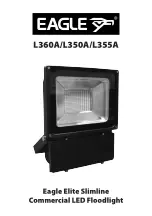
17
•
Disconnect the charger from the outlet before attempting any cleaning. This will reduce the risk of electric shock.
Removing the
battery pack will not reduce this risk.
•
NEVER
attempt to connect 2 chargers together.
•
The charger is designed to operate on standard 230V household electrical power. Do not attempt to use it on any other voltage.
This does not apply to the vehicular charger.
Charging a Battery (Fig. B)
1. Plug the charger into an appropriate outlet before inserting battery pack.
2. Insert the battery pack
7
into the charger, making sure the battery pack is fully seated in the charger. The red (charging) light will blink repeatedly
indicating that the charging process has started.
3. The completion of charge will be indicated by the red light remaining ON continuously. The battery pack is fully charged and may be used at this time or
left in the charger. To remove the battery pack from the charger, push the battery release button
8
on the battery pack.
NOTE: To ensure maximum performance and life of lithium-ion battery packs, charge the battery pack fully before first use.
Charger Operation
Refer to the indicators below for the charge status of the battery pack.
CL3.CH1018
Charging
Fully Charged
Hot/Cold Pack Delay
Problem Pack or Charger
CL3.CH115
Charging
Fully Charged
Hot/Cold Pack Delay*
* : The red light will continue to blink, but a yellow indicator light will be illuminated during this operation. Once the battery pack has reached an appropriate
temperature, the yellow light will turn off and the charger will resume the charging procedure.
The compatible charger(s) will not charge a faulty battery pack. The charger will indicate faulty battery pack by refusing to light or by displaying a problem
pack or charger blink pattern.
NOTE: This could also mean a problem with a charger.
If the charger indicates a problem, take the charger and battery pack to be tested at an authorized service center.
Hot/Cold pack delay
When the charger detects a battery pack that is too hot or too cold, it automatically starts a Hot/Cold Pack Delay, suspending charging until the battery pack
has reached an appropriate temperature. The charger then automatically switches to the pack charging mode. This feature ensures maximum battery pack life.
A cold battery pack will charge at a slower rate than a warm battery pack. The battery pack will charge at that slower rate throughout the entire charging cycle
and will not return to maximum charge rate even if the battery pack warms.
Electronic Protection System
Li-Ion tools are designed with an Electronic Protection System that will protect the battery pack against overloading, overheating or deep discharge.
The tool will automatically turn off if the Electronic Protection System engages. If this occurs, place the lithium-ion battery pack on the charger until it is fully
charged.
Wall Mounting
This charger is designed to be wall mountable or to sit upright on a table or work surface. If wall mounting, locate the charger within reach of an electrical
outlet, and away from a corner or other obstructions which may impede air flow.
NU-FCL045_0817.indd 17
04/08/2017 09:34:05
Summary of Contents for FCL045
Page 3: ...3 1 2 3 5 7 4 8 6 Fig A Fig D 11 Fig B 7 6 Fig C 8 7 NU FCL045_0817 indd 3 04 08 2017 09 33 50...
Page 4: ...4 Fig G 9 10 Fig F Fig E NU FCL045_0817 indd 4 04 08 2017 09 33 52...
Page 93: ...93 EL NU FCL045_0817 indd 93 04 08 2017 09 34 26...
Page 95: ...95 FACOM 2 230V 1 2 7 3 8 NU FCL045_0817 indd 95 04 08 2017 09 34 26...
Page 102: ...102 FACOM FACOM FACOM NU FCL045_0817 indd 102 04 08 2017 09 34 28...
Page 103: ...103 FACOM FACOM 24 FACOM NU FCL045_0817 indd 103 04 08 2017 09 34 28...
















































